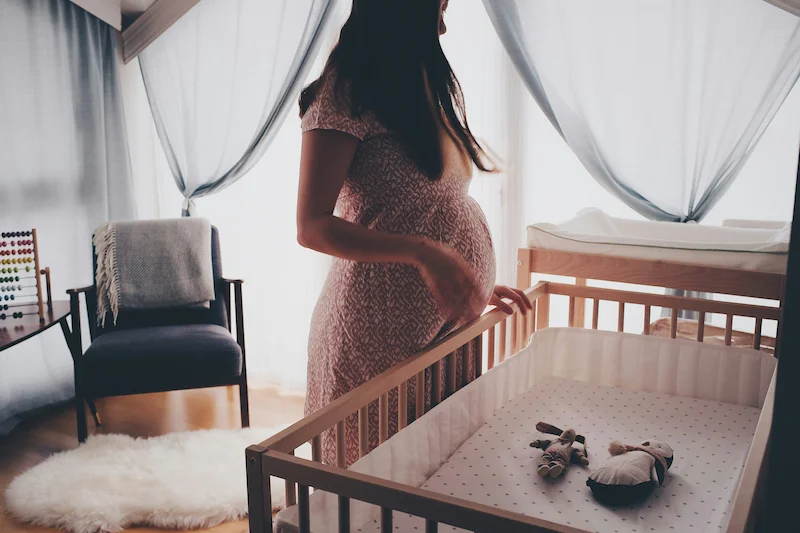Month 8: The Home Stretch
Weeks 33-36 of Pregnancy

You are truly in the home stretch now! Your baby is putting on weight rapidly and fine-tuning the skills needed for life outside the womb. While the physical demands of late pregnancy can be challenging, remember that each day brings you closer to meeting your baby. This month is all about final preparations - both your body's and your own.
What is Happening This Month
Month 8 is characterised by rapid growth and development. Your baby is gaining about 220g (half a pound) per week! Space is getting tighter in the womb, so movements may feel different - less prominent kicks and punches, and more rolls and stretches. Many babies begin to settle into a head-down position in preparation for birth. Your body is also preparing, with practice contractions becoming more noticeable.
Week-by-Week Development
Baby's bones are hardening, except the skull which stays soft for delivery. Rapid brain development continues. Baby can detect light changes through your belly.
Lungs are maturing and the production of surfactant now increases. Baby's fingernails reach fingertips. Central nervous system and immune system continue developing.
Baby's kidneys are fully developed and liver can process waste. Rapid weight gain begins - about 220g (half a pound) per week. Most major organ development is complete.
Digestive system is nearly ready for breast milk. Baby's grip is getting stronger and reflexes are more coordinated.
Your Baby's Development
By the end of month 8, your baby has grown to about the size of a butternut squash (40-42cm) and weighs approximately 1.7-1.9kg. Key developments include:
- Rapid weight gain - adding layers of fat for temperature regulation after birth
- Skin becomes less transparent and more opaque as fat accumulates
- Lanugo (fine body hair) begins to disappear
- Baby's kicks and movements are stronger but may feel less prominent due to limited space
- Brain continues rapid development, forming billions of neural connections
- Lungs are nearly mature but still producing surfactant
- Baby sleeps 90-95% of the day in 20-45 minute cycles
- Most babies turn head-down by the end of this month
- If born now, baby would likely need minimal medical intervention
Size Comparison
Your baby is about the size of a butternut squash
40-42 cm (16-17 inches) | 1.7-1.9 kgChanges in Your Body
The eighth month can bring increased discomfort as your body prepares for labour. Remember, these symptoms mean your body is doing exactly what it should. Be gentle with yourself and rest when needed:
Braxton Hicks
Practice contractions become more frequent and may be uncomfortable
Pelvic Pressure
Increased pressure as baby settles lower into your pelvis
Fatigue Returns
Carrying extra weight and poor sleep contribute to exhaustion
Rib Pain
Baby's feet may press against your ribs causing discomfort
Leaking Breasts
Colostrum may leak as breasts prepare for breastfeeding
Varicose Veins
Increased blood volume and pressure can cause visible veins
Important Care Tips
Regular Antenatal Appointments
Appointments are now every 2 weeks. Your healthcare provider will check baby's position and heart rate, measure your bump, test urine, and monitor blood pressure. Around week 32-34, you may have another ultrasound, if necessary, to check baby's growth and position. Do not hesitate to discuss any concerns or birth preferences.
Complete Antenatal Classes
Finish your antenatal classes this month if you have not already. Focus on labour signs, pain relief options, breathing techniques, perineal massaging and newborn care. Many facilities offer breastfeeding workshops - these are invaluable for getting off to a good start. Partners should attend to learn how to support you.
Finalise Preparations
Complete your hospital bag with essentials for you, baby, and your birth partner. Ensure you have newborn car seat installed correctly. Stock your freezer with easy meals for you for after birth. Create a birth preferences plan and share copies with your healthcare team. Arrange care for other children or pets.
Rest and Self-Care
Prioritise rest - take naps when possible and go to bed early. Practice relaxation techniques you have learned. Gentle exercises like swimming can relieve aches. Consider pregnancy massage for back pain and perineum massage to help minimise tears in labour. Do not feel guilty about slowing down - growing a baby is hard work!
When to Contact Your Midwife, GP or Obstetrician
As you approach full term, knowing the signs of preterm labour and other complications is crucial. Contact your midwife or GP immediately if you experience:
- Regular contractions (every 10 minutes or more frequently)
- Vaginal bleeding, even light spotting
- Sudden gush or steady trickle of fluid (waters breaking)
- Decreased fetal movement
- Persistent abdominal pain or cramping
- Severe headache, vision changes, or seeing spots
- Sudden severe swelling in face, hands, or feet
- Difficulty breathing or chest pain
- Calf tenderness or swelling
Looking Ahead
As you enter your final month, remember that only about 5% of babies arrive on their due date. Most first babies arrive after the due date, so patience may be needed! You will have your next routine antenatal appointment around 36 weeks. Focus on rest, gentle activity, and connecting with your baby. Practice your breathing and perineal exercises and visualisation techniques. Trust your body - it knows what to do. You are almost there!
